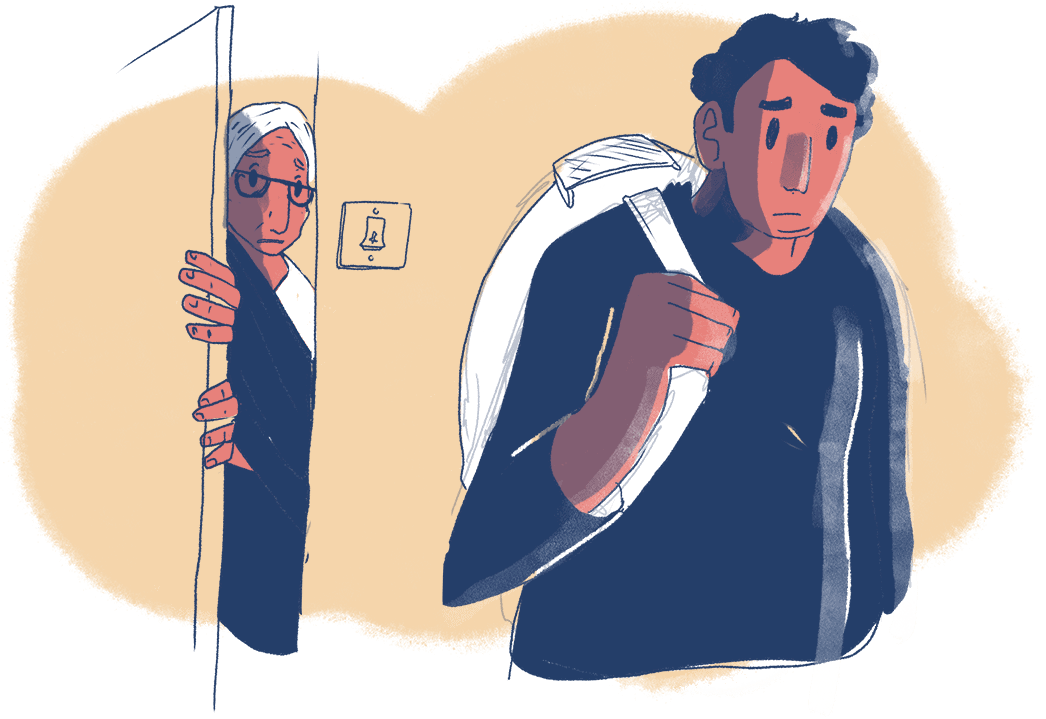
Navigating public and private spaces in the midst of a pandemic
Vikram, 35 and Tanvika from Vikalp (translating and editing), | ![]() Gujarat, India
Gujarat, India
As a trans man, there are a lot of instances that I have had to face head on which perhaps, in some way or the other, have made me who I am today. After my father passed away when I was young, my mother was being forced to marry his brother. She explicitly refused and moved away with my younger sister to escape the situation. This is how I came to be adopted by my grandmother. I share a love-hate relationship with my grandmother, and nothing else proves this fact more than the situation we found ourselves in with the onset of the COVID-19 pandemic.
Though reluctant to move away from Vadodara, I shifted to Bengaluru, much against my wishes, because my transition to my preferred gender elicited comments and gestures from colleagues at my workplace in Vadodara in the form of mockery. I tried at that point of time to negotiate through this experience, to just move beyond those comments, but no matter how hard I tried, they always ended up catching up with me. So I moved to Bengaluru and eventually I secured a job there. In a few months however, I returned – things did not seem to work out there either. I also felt that my grandmother was getting older and needed help more often now. That sense of responsibility kept me grounded to Vadodara. I found and began a job in Vadodara. The relative security I experienced was dismantled when only a few months after I began this job, COVID struck.
The financial situation at home was not exceptional to begin with – the pension that my grandmother received was not enough to sustain the household. Fears of being laid off from work began to take root inside of me. Companies were starting to reduce staff members; they said, “We can’t afford to pay everybody”. I couldn’t take this. Not only would I lose my sole means of livelihood, but being unable to engage in work outside of home would take my sense of independence away from me. So I waited.
Eventually, my workplace gave me an ultimatum – either I could leave the job, or stay on only if I accepted their conditions of work. The condition was that my work would primarily require me to travel. Travelling in the midst of a pandemic, at a time when even doctors and scientists knew next to nothing about the new virus, was a ridiculous choice to be offered. Stuck between a rock and a hard place, I found myself accepting this condition. Apart from the stress of managing the household in a modest way, I now had to worry about not bringing back the virus from my travels, risking my own health and especially that of my aged grandmother. I happened to be en-route from Hyderabad to Raichur when the national lockdown was announced. I was rendered completely helpless when I got off at a station and everything was closed. Nearby lodgings had been shut down, and there was nowhere to take shelter. Cabs at the station were adamant about charging almost INR 1600 for only a couple of kilometers. I had no choice but to sleep at the station itself, not knowing what was in store for me.
While I had already transitioned, and perhaps would be perceived as a man by everyone, I experienced severe insecurity and feared being so vulnerable in a public space like this. I eventually had to share a private auto with two other people, and from there, had to hitchhike in a local vegetable tempo! The novelty of the lockdown and virus at that time meant that people did not take it seriously; there were no sanitizers in sight, no way to protect myself from getting infected.
One aspect of this situation which has been peculiar for me has been navigating between the private and the public space. My grandmother relies on me to earn a living and manage the house, but she also experiences bouts of insecurity and annoyance when I leave the house to go earn that income. There is an added fear because of the virus. I must work hard outside, but I also must give equal attention at home. As we complete almost a year since we first went into a lockdown because of COVID-19, I still question myself – how do I traverse these spaces without conflict? My grandmother has been the only parental figure I have known, but it has not always been an easy relationship. Ever since our parents have been absent in our lives, she has always taken upon herself a responsibility for my sibling and me. An extension of this has been the expectations she has from me. She has always urged me to be the ideal “woman” who gets married to a man. Now, she often asks neighbours to set me up with a woman. But she also often complains about my transition and says to me, “Look what you’ve done to yourself”. Even in the private sphere, I am unable to rid the air of ambiguity.
During the lockdown in March, another instance affected me on a very personal level. The rigid protocols of COVID-19 meant that I was unable to access hormones. Priorities of the already crumbling healthcare system had to be diverted to the needs of the fast-spreading virus. For many, this would count as a non-emergency medical situation, but for me, missing my regular dose of hormones meant the difference between health and illness. A complex interweaving of expectations and necessities plays out in everyday life, and COVID-19 has done much to intensify these feelings.